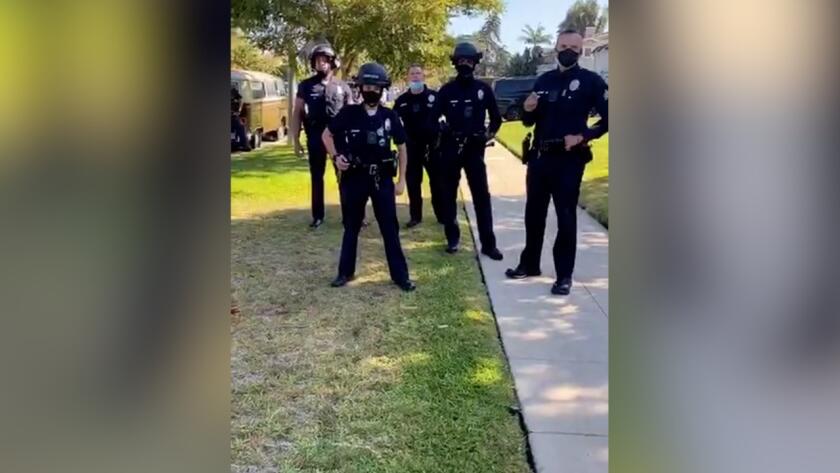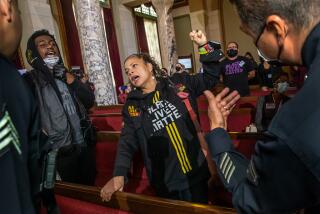Black Lives Matter leader targeted in third ‘swatting’ incident, the second since last week
- Share via
Video from a “swatting” incident at Melina Abdullah’s home last year. Since then, Abdullah has been swatted twice more.
- Share via
Melina Abdullah, a prominent protest leader and co-founder of Black Lives Matter Los Angeles, was the target of a third “swatting” incident at her home Wednesday evening — the second one in the last week.
Abdullah was not home at the time but said multiple neighbors alerted her to a large police presence on her block. One FaceTimed her, she said, and she could see police vehicles and officers with their guns drawn outside her home.
Capt. Stacy Spell, a Los Angeles Police Department spokesman, confirmed the response and said it followed a 911 call about 5:45 p.m. from a person who falsely claimed he had kidnapped Abdullah at gunpoint.
Because of the “serious nature” of the call and threats the caller made to “do harm” to Abdullah, six police units and a supervisor responded to the scene — all left “shortly after it was determined that no one’s safety was in danger,” Spell said.
“It is the department’s obligation to treat every radio call, especially those threatening violence, seriously until we can determine otherwise,” Spell said.
The incident will be investigated as a swatting, Spell said. The LAPD has launched investigations into each of the past incidents as well and said officials believe a person or group using digital tools to cover their tracks is responsible.
Swatting occurs when someone falsely reports an emergency in order to draw a large police presence to a location. Such incidents are considered dangerous for the targets and have been deadly in the past.
Abdullah said the incident was more evidence she is being targeted for her activism and yet another reminder to “stay vigilant.”
She also said it would not deter her from her work pushing criminal justice reforms and protesting police injustices.
“No one is going to scare me out of activism. No one is going to scare me out of justice work,” Abdullah said. “The way we stay safe is by having more of us involved in the work.”
The incident was the second of its kind at Abdullah’s home since last week, when Abdullah filed a lawsuit alleging that the LAPD mishandled its response to a swatting incident at her home in August 2020.
“This sure looks like retaliation for her filing a lawsuit,” her attorney, Erin Darling, said Wednesday night.
In the incident last year, a caller to 911 alleged that he was holding people hostage in Abdullah’s home and trying to send a message that “BLM is a bunch of retards.” The incident was resolved after Abdullah exited her home with her hands in the air in response to commands for her to do so from officers with their guns drawn.
In her lawsuit, Abdullah alleged that the LAPD badly mishandled the response and that officers’ actions constituted unlawful seizure, false imprisonment, excessive force, assault and negligence, among other violations of her rights.
The day after Abdullah announced her lawsuit, a caller claiming to be her young son alleged that Abdullah had overdosed on pills and needed help. Police again responded and were able to determine that the call was false after one of Abdullah’s neighbors called her.
On Wednesday, Abdullah said she was once again grateful to her neighbors, who she said proved once more that community members are key to keeping each other safe.
“My neighbors kept me safe today. My neighbors kept me safe last week,” Abdullah said. “Watching out for each other is an imperative.”
The LAPD’s Major Crimes Division, which launched an investigation after the first call to Abdullah’s home last year, has yet to identify a suspect, but authorities believe the person responsible also made false calls to other police departments in the country.
The person used “anonymizing technologies” to hide their identity and location, including a virtual private network, or VPN, and voice over internet protocol, or VOIP, the LAPD said.
“Investigative returns show a possible nexus to a professional group of cyber hackers who use VPNs to create anonymous overseas email accounts, and then subsequent VOIPs to facilitate the crime by placing calls over the internet,” the LAPD said.
More to Read
Sign up for Essential California
The most important California stories and recommendations in your inbox every morning.
You may occasionally receive promotional content from the Los Angeles Times.












